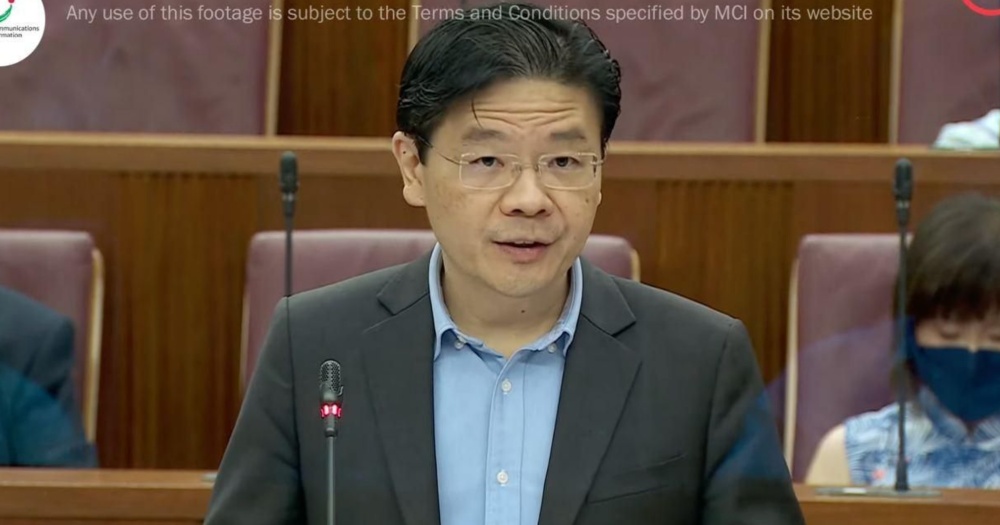Follow us on Telegram for the latest updates: https://t.me/mothershipsg
Following a review of the "elevated" inflation situation, the Assurance Package, which aims to help households with the coming Good and Services Tax (GST) increase, will be topped up with an additional S$1.4 billion.
This means the Assurance Package will now reach about S$8 billion.
The announcement was made by Deputy Prime Minister and Finance Minister Lawrence Wong in Parliament on Nov. 7, at the second reading of the GST Amendment Bill.
Details of the enhancement will be shared at Budget 2023, Wong added.
The GST will increase by one per cent on Jan. 1, 2023 and then by another one per cent on Jan. 2, 2024.
Assurance Package must be correspondingly increased in light of higher inflation
The move ensures that the package will continue to offset additional GST expenses for the majority of Singaporean households for at least five years, and around 10 years for lower income households, Wong said, noting that inflation and therefore household expenditure is expected to remain high in the coming years.
The Assurance Package was first announced in 2020 by then-Finance Minister Heng Swee Keat, at S$6 billion.
It was then enhanced with S$640 million at Budget 2022.
Permanent GST voucher scheme will continue even after Assurance Package has ended
The minister also noted that there had been comments about how the Assurance Package, no matter how generous, is only temporary.
Wong said that while this was indeed the case for the package, such commentators do not understand that there is another important design feature of the GST; the permanent GST Voucher Scheme and the government absorbing GST for subsidised education and healthcare.
"Households already receive these offsets today and as permanent measures, they will continue alongside and even after the Assurance Package," he said.
Through the GST vouchers, the government has helped lower to middle income households defray a significant part of their GST expenses permanently, Wong added.
These vouchers have four components: Cash, Medisave for seniors to support their medical needs, U-Save rebates to offset utilities bills, and Service and Conservancy Charges (S&CC) rebates.
Coupled with the government absorbing GST for publicly subsidised healthcare and education, what Singapore has is a GST system that taxes in a "fair and effective" manner, Wong said.
Singapore has a multi-tiered GST system
This led to Wong's next point that Singapore has a multi-tiered GST system, with lower income households paying a much lower effective GST rate than higher income households.
"On average, the bottom 10 per cent of households do not pay any GST at all after the permanent offsets. This includes many retiree households without income and even after the GST increase, the effective GST rate for households in the first three income deciles remains unchanged at below three per cent."
This means that the GST increase will not negatively impact them, he elaborated.
Bottom 10 per cent of households don't pay any GST, after offsets
The full impact of the GST will be borne largely by higher income households as well as tourists and foreigners who are based here, according to Wong.
This is also the group that contributes the biggest share to net GST revenues from households and individuals, Wong said.
"As the inflationary outlook evolves, we will continue to monitor our scheme parameters to ensure that we uphold and maintain these objectives.
The GST is therefore a key part of our fair and progressive system of taxes and transfers that takes care of the less well off, and ensures that those who are better off contribute their fair share in revenues."
Bill will also amend GST treatment of travel-arranging services
Wong also explained a second amendment in the bill pertaining to the GST treatment of travel-arranging services.
The minister pointed out that currently, the basis for determining whether a travel arranging service qualifies for zero per cent of GST, depends on factors like the location of the accommodation or whether the transportation being arranged is international in nature.
Today, if the accommodation is located in Singapore, GST applies. But if it's located abroad, it is not subject to GST.
However, the current treatment does not accurately reflect the place of consumption of such travel arranging services. Such arranging services are consumed by Singaporeans at the point of booking, rather than at the eventual place of consumption of the underlying travel product.
Hence, with effect from Jan. 1, 2023, the GST treatment for travel arranging services will be based on where the person who contracts for the service, and where the person who directly benefits from the service belong.
"For example, if the contractual customer of the services belongs in Singapore, then GST will be charged at the standard rate," Wong said.
This amendment will also ensure consistent GST treatment for travel arranging services, regardless of whether they are rendered by local or overseas providers, he said.
Other amendments in the bill
Wong also touched briefly on other amendments in the bill.
These include refining the rules for taxing low-value goods and imported services so as to prevent double taxation, provide tax certainty and ease the compliance of doing business, empowering the controller of GST to extend the deadline of filing GST returns and countering missing trader fraud.
In highlighting that such changes are needed to make Singapore's revenue structure stronger and more resilient, Wong said:
"This GST rate increase is an important revenue move that will provide us with additional resources to meet our growing healthcare expenditures and to take better care of our growing number of seniors.
The government will help all Singaporeans adjust to the GST increase, especially the less well off. We will help every Singaporean family through the Assurance Package."
Top image via Gov.sg YouTube.
If you like what you read, follow us on Facebook, Instagram, Twitter and Telegram to get the latest updates.
